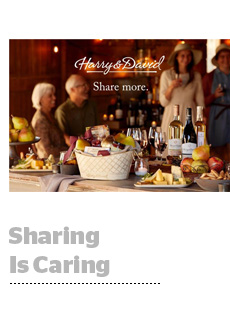
Loyalty has never been a problem for Harry & David, an 84-year-old company that sells and delivers premium foods and gift baskets.
When December rolls around, most of its customers don’t need to be reminded that it’s time to order their holiday-themed gourmet treats.
The challenge is getting people to engage with the 1-800-Flowers-owned brand year round for birthdays, thank-you’s, occasions of sympathy or just because.
“The objective has gone from being very focused on our holiday business, which is what we were founded on, to becoming a source for everyday sharing and gifting,” said Michelle Farabaugh, Harry & David’s CMO.
Harry & David aims to bring that sentiment to life with a new brand positioning centered on sharing with friends and family and through a digitally-focused marketing campaign that encourages gift-giving throughout the year.
“Print was the backbone of our marketing for decades,” Farabaugh said. “But now we’re trying to leverage every channel at our disposal, whether that be the user experience on the website or email, digital advertising, search or affiliate.”
AdExchanger spoke with Farabaugh in the midst of the fall harvest season in southern Oregon, where Harry & David is based.
 AdExchanger: How far along is Harry & David in its digital transformation?
AdExchanger: How far along is Harry & David in its digital transformation?
MICHELLE FARABAUGH: We’ve made a lot of progress over the last couple of years and it’s showing in our results and our customer engagement. If I had to say, I’d put us at 80-90% completion, but we’re still working.
Print will always play a role for us, but we’re fitting it into an omnichannel contact strategy and looking at it from a CRM perspective. We’re putting data and insights at the heart of our marketing programs. The more we learn about our customers, their journey and what drives the behavior we’re looking for, the more we can evolve our marketing strategy.
How exactly does Harry & David use data to inform marketing?
We leverage data for our membership program to see who is coming in and what the behavior is like so we can learn how to drive the behavior we’re looking for, as well as the right levels of loyalty and frequency.
We also examine the cost per acquisition of every channel, which is getting harder and harder to measure the more interactions we have across multiple channels. We examine CPA compared with acceptable lifetime value to make sure we’re promoting the right products with the right communications. We have a business intelligence team that’s very focused on this.
Does Harry & David get to take advantage of data from 1-800-Flowers and its other brands?
One of the advantages of being a part of the 1-800-Flowers family of brands is the opportunity to cross-sell products based on past purchases, whether that’s around the holidays or a birthday.
There’s one loyalty program available across all of the brands and you can use one cart to check out. When we talk to customers about an upcoming occasion, whatever it is, it’s our job to make them aware of this.
Does Harry & David work with an agency or do media buying in-house?
We do sometimes work with small specialist agencies if we need expertise in a certain area or channel, but we’re very hands-on and we approach media buying as an enterprise. We leverage all of our media learnings across the family of brands. Not every program or media is appropriate in every case, so our in-house team figures what makes sense for each brand. They’re always testing and looking for new opportunities, channels and ways of communicating.
What about programmatic?
We do more PMPs deals, which we feel are a little more targeted.
What about creative?
We develop almost 95% in-house. We’ve always have plenty of print talent in-house, but as consumer demands have changed, we’ve had to bring in more digital and video talent. Video is a big part of the repositioning work we’re doing.
Bringing talent in-house was a strategic decision we made a long time ago. Because so much of what we do is based right here in Oregon, it helps having a team that’s really immersed in our brand.
What was the primary motivation behind Harry & David’s recent brand repositioning?
We know that consumers are gravitating toward and looking for authentic, transparent brands, and that means we need to share more about what’s important to us and listen to what’s important to our customers.
Every part of the Harry & David experience is shared, whether you’re sending a basket or having friends over for the holidays, for game night or afternoon tea. We also have experiential marketing efforts like our “Dinner of the Month” program, where chefs and restaurants use our products to create a custom menu that people can enjoy together.
We’re a very vertically integrated brand and we want to show it, from the way we hand pick Royal Riviera pears in our orchard to how we drizzle our truffles with chocolate. This is more than just a marketing and communications repositioning, it’s part of our company culture.
This post was syndicated from Ad Exchanger.


More Stories
Inghams teams up with Together for groundbreaking media strategy
Exclusive: Academy CEO Expects Oscars Ratings to Defy Gravity Thanks to Streaming
Tokyo hosts first-ever OOH industry conference